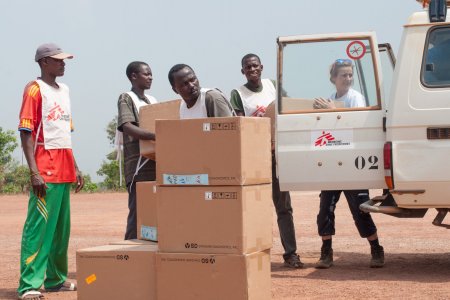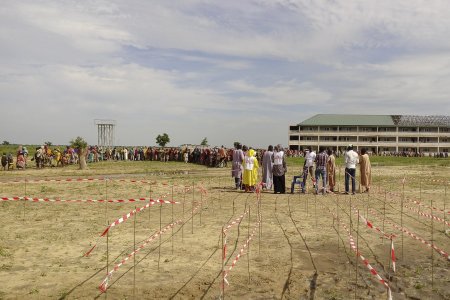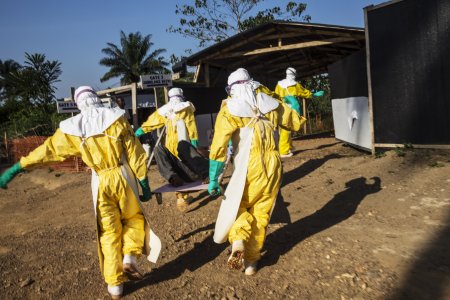
Management at MSF
Marion Péchayre & Elba Rahmouni
In this interview, different issues related to management at MSF are broached with Marion Péchayre, Director of Studies at the CRASH, such as the fragmentation of different components of our work, professionalisation drifting towards an attitude of control as embodied by the multiplication of management tools and the omnipresence of requests for validation, and the devaluation of the role of the individual against the promotion of a pseudo-scientific presentation of facts and projects.
1. In operational and institutional discussions in recent years, certain difficulties have been characterised as management problems. Though the meaning of “management” is often considered as self-evident, it actually covers a variety of notions. At Médecins Sans Frontières, we use it to designate different realities, depending on whether we’re talking about work methods, project management, human resource management, or organisational structure. Why did you approach the management question and how did you research it?
Without a political discussion about work and work relationships, all organisations tend to promote conventional management practices – practices that, because they have been predominant in our world since the early 20th century, seem neutral. The cardinal value of conventional management is performance, both collective and individual, which it defines in terms of achieving objectives, which are themselves evaluated using (very often quantitative) indicators. From that perspective, work is assumed to be predictable because it is reduced to a combination of processes and time frames, and must meet quality standards defined by each department. This “scientific management”, originally conceived for industrial mass production, established rules for the division of labour such that each worker specialised and contributed to the production of a standardised product. In this approach, the overall quality of the finished product is thought to be the sum of the quality of each worker’s work.
Over the course of its history, MSF has been no exception and has adopted, if not all conventional management practices, at the least its theoretical framework. Historically, the work progressively became organised by department, each department specialising in one domain of action: logistics, finance, human resources, etc. The same approach continued in the form of external expansion with the creation of satellites like MSF-Logistique and Epicentre in 1987. As Rony Brauman reminded us at the workshop on medical quality held by CRASH in 2016, that structure came about in reaction to the lack of professionalism and from a desire to improve the level of patient care by standardising at least some medical practices. It was thanks to that, in large part that MSF grew into an organisation capable of treating millions the world over. That specialisation also helped improve the quality of medical care in the field. Nicolas Dodier, ‘Contributions by Médecins Sans Frontières to Changes in Transnational Medicine’, in Medical Innovations in Humanitarian Situations: The Work of Médecins Sans Frontières, by Jean-Hervé Bradol and Claudine Vidal (New York: Doctors Without Borders, 2011), 200–224. For some time now, however, we have probably gotten carried away by this growth with a tendency to increasingly divide work into subspecialties, even within each department.
The excessive division of labour now hinders us daily. Interdepartmental tensions – both at HQ and in the field – are legion, because there is more vertical communication within a given function than between members of the same project team. That fragmentation of labour makes it hard for all of us to get a clear view of the structure, to understand ‘who does what’. Field staff often wonder whom they should contact with a given question, or who is responsible for making a given decision. People at headquarters complain about getting far too many validation requests and people in the field about not being consulted, or included, in certain decisions. While our procedures enable us to manage large volumes (of purchases, recruitments), which is essential, we have difficulty freeing ourselves from them when there’s an unusual need – for example, to recruit plastic surgeons or gynaecologic oncologists.
We have imported not only the idea of organising our work by speciality, but also the idea that the overall quality is the sum of the qualities of each specialty and the associated assumption that human error is the main source of problems in project implementation. Conventional management tells us to minimise the “human factor” by putting procedures and standards in place. Yet thinking about the nature of our work at MSF, which is the production of medical and humanitarian operations, it seems to me that it is characterised by a high degree of uncertainty, which requires participation by people to adapt procedures and other guidelines to each situation. In our work, decision-making is often a bet based at least as much on individuals’ experience and ability to discuss options with colleagues as on their knowledge of standards, guidelines, and medical science.
The current structure has resulted from a series of reorganisations and the creation of new positions or new departments – the most recent, like the move from “desks” to “cells”, already an attempt to address certain problems such as “working in silos”. My intuition is that we should now try working with the organisation as it stands, thinking about how we can make our ways of working evolve together to counterbalance the structural tendencies. This will perhaps lead to structural reform down the road.
2. In La Revue Critique Borno, authors Judith Soussan and Fabrice Weissman explained that the management tools used by the teams at headquarters and in the field (Fiche projet, MAPs, visit reports, sitreps, etc.) failed to clarify or settle several debates. They showed that headquarters (or the country coordination team) was more geared towards control than towards support for field teams, and that the field tended to self-censor. What can you tell us about the management tools at MSF and how decisions are made?
I would say that we have both too many and too few management tools. Too many tools from support services, which add up for the field teams, and too few cross-cutting tools for the coordinators transversal monitoring of projects.
So there is an accumulation of requests for reports – mainly from support services – so that people in the field feel sometimes overwhelmed by the MSF bureaucracy, and so that some spend more time in front of their computers than with patients or outside interlocutors. Project coordinators, on the other hand, bemoan the lack of cross-cutting tools and processes to facilitate a transversal monitoring and management of projects. Some, for example, complain about how disconcerting it can be not to have a clear, institutionalised project management framework to refer to when they take up their positions. A chronic complaint from project coordinators is that projects’ objectives are not always clear or change for unknown reasons. Some add that when changes occur they feel they do not have a say or an influence on the decisions made.
We can speculate that having both too many tools from support functions (for reporting and monitoring) and too few tools for supporting transversal decision-making results in experts working in silos, making it harder to develop operational policy at the project level.
3. Who hasn’t heard or read the word “validation” in the course of their workday, either when receiving a request or being told that the competent authority is waiting for one? From the Latin validare, which means to fortify, in contemporary usage “validation” refers to a procedure to strengthen an action. What do you think about our use of validations?
In my opinion it is extensive and excessive. At first glance, it seems justified when it’s a matter of ensuring that salaried employees’ contracts comply with employment law, or of supervising the purchasing process to make sure that the best price was sought and the risk of corruption minimised by quotations’ requests, or to ensure drug quality through pharmacist validation.
However, building work relationships based on requesting or waiting for validation poses a number of risks. First, the decision itself can be held up while awaiting validation, and doing nothing is a choice that has real-life consequences. Second, validation requests do not necessarily prompt any discussion, though discussion is crucial to exposing disagreements, justifying a disagreement, or convincing a colleague that a viewpoint is relevant. There are, of course, situations in which such discussions have already taken place or aren’t necessary because the validation request is a mere formality for sharing and preserving information. But there are many other situations that would benefit greatly from having an exchange of opinions between several people in order to come up with an analysis or decision that considers the viewpoints of the different people involved (and potentially impacted), rather than a summary validation or denial.
It was clear in La Revue Critique Borno that when it came to taking a position on whether to launch an exploratory mission in the town of Bama, the email exchanges to request validation was like an atrophy of the operational discussion.
4. Broadly speaking, we can distinguish between objectives and operational policies. The former are the bureaucratic expression of the latter. What seems important for an objective is to be what conventional management calls SMART: Specific, Measurable, Accurate, Relevant, and Time-bound. In real life, operational policies are based on political choices – and as such, they are never neutral, and they elicit a reaction. It’s not uncommon for MSF operational managers to present their projects in framework documents in the form of “sanitised” objectives, rather than as inspiring ideas that reveal their assumed biases. Why is that?
I don’t think it only happens at MSF, but it’s amazing that – even when we aren’t subject to the bureaucratic constraints imposed elsewhere by institutional donors – we follow certain codes, such as formulating project objectives that always look somewhat the same, e.g., “to reduce morbidity/mortality related to xx in region xx”. When reading a project sheet, for example, it’s often difficult to perceive what’s really going on in it. Similarly, it’s hard to tell from a sitrep whether the teams are satisfied with their work or the project or whether or not everything’s going as the team members would like.
That seems to me to come from the fact that we have a false idea of what is professional, where we think being professional means using the most “objective” language possible, even if that means rendering simple, concrete, and interesting ideas unintelligible. Mimicking others, the operational managers prefer to use passive expressions like “it was decided that” instead of “I/we want/think/deem….” These expressions and the lack of precise information gives an appearance of neutrality to what should, on the contrary, be presented as a choice and owned as such.
When we question the operational managers verbally about their project, they have no problem expressing their enthusiasm or the meaning they give their involvement. So it’s not the inability to think but rather the habit of masking the role of individuals, as if expressing an opinion in writing isn’t professional. That is another reflection of conventional management techniques aimed at eliminating the “human factor”. In my opinion, we should encourage everyone to make their professional judgement visible in order to create a narrative supported by facts, key figures, and observations from the field.
5. Over the years, representatives from the Medical, Logistics, Human Resources, Finance, and other departments have increasingly positioned themselves as a guardrail against what is arbitrary, dangerous, or wasteful, to the point that they now act more like internal enforcers reminding us what cannot be done than like support for our day-to-day efforts to create operations. So are the support functions just being vigilant? How did we get to this point?
It would seem that each function evolved, over the years, with the aim of becoming as expert as possible in its area. They did this by developing techniques, tools, standards, procedures, and guidelines to create a corpus of “business rules”. I would go so far as to say that each department has gradually developed a main quality criterion that guides its work; members of the HR department feel responsible for ensuring a minimum of equity between all MSF employees. Members of the medical department push MSF toward the standards of current medical science. Responsiveness is probably one of the most important quality criteria for the emergency cell, and so on.
The anomaly is that in doing this we have set aside the profession that unites all of us at MSF, our shared vocation, the creation of humanitarian medical responses, which actually lies in the art of combining all of these functions and making trade-offs so that we can mount relevant humanitarian medical operations. What I mean by that is that it’s normal and inevitable that there are “conflicts of norms” Expression used by occupational therapists, legal experts, and social scientists.between these different functions, but that we have to mediate between them in the direction of this shared vocation. For that to be possible, the operational managers must think of their support function colleagues as people whose professional judgement about operations is worthy of interest and include them in operational policy discussions, rather than just presenting their decisions and asking each to do what is necessary in their area to make them feasible.
Interview conducted by Elba Rahmouni.
To cite this content :
Marion Péchayre, Elba Rahmouni, “Management at MSF”, 28 février 2020, URL : https://msf-crash.org/en/blog/humanitarian-actors-and-practices/management-msf
If you would like to comment on this article, you can find us on social media or contact us here:
Contribute




Add new comment